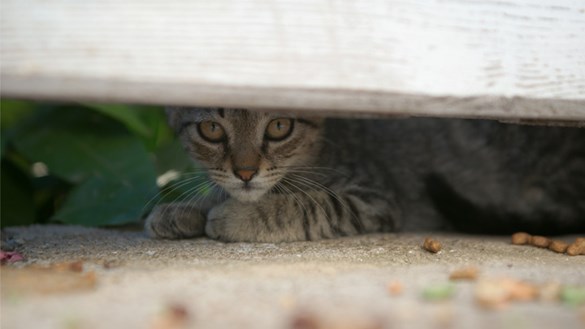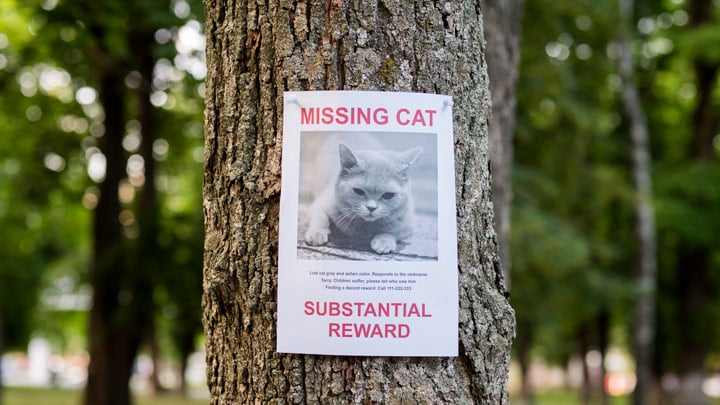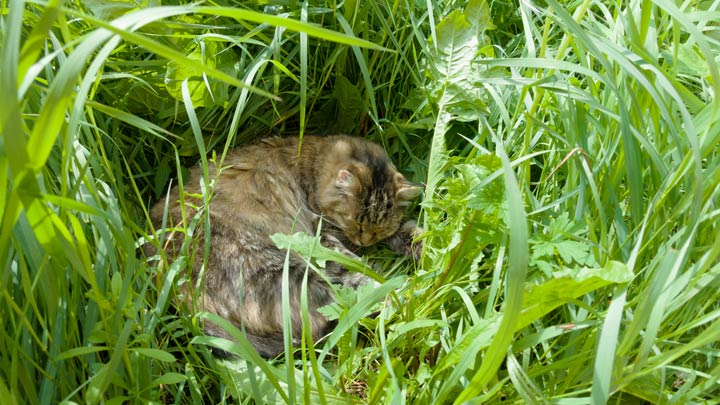Lost Cat
What to do if your cat or kitten is lost
Many cats are wanderers by nature and can prove very self-sufficient – nonetheless it’s still a real worry when they don’t stick to their usual routine. We’ve got some advice on how to keep your cat safe and what you can do if they do become lost.

How do I stop my cat getting lost?
As cats are wanderers, they’re not the easiest to contain but there are a couple of things that you can do that may help:
- Neutering – unneutered male cats tend to roam in pursuit of female cats. This is just another benefit of neutering your cat
- Microchipping– many cats have been reunited with their worried owners thanks to a microchip. It’s now law that all cats are microchipped. If your cat becomes lost and is handed into a vet or rescue centre, the first thing they will do is check for a chip. If you move house or change your telephone number, please always ensure your details are updated. When your cat goes to the vet for a regular check-up, it’s good to just get them to check the chip and ensure that the chip is registered. You’d be amazed at how many chipped, but not registered pets our practices see
- Try and keep your cat indoors at night – this means they have less time to travel longer distances when the roads and streets are quieter
- Install a cat flap – if your cat is really not one for staying in, then a cat flap into the house, a garage or a shed will mean they have somewhere safe to go when they do decide to call it a night! This could save them wandering off again for more adventures

What should I do if my cat or kitten goes missing?
1. Check your house
The first thing to do is check your house thoroughly. You’d be surprised at how many kittens or younger cats simply find somewhere safe and cosy to take a nap within the house. Kittens have been found in the smallest of gaps behind or under kitchen cabinets, in a box inside a wardrobe and plenty of other random places. They may even have crept into somewhere and now be stuck.
Don’t limit the search to inside the house, check garages, sheds, behind bins, inside bins, neighbours’ gardens and under cars. If your cat is injured, they may be hiding somewhere trying to keep safe.
2. Check your neighbourhood and surrounding streets
If there’s no sign of your cat in your house and immediately around your property, the next step is to widen the search. Check any routes that you know your cat uses regularly, almost like you’re tracing their steps. Call their name and check behind bushes and anywhere a cat may hide.
Ask immediate neighbours to check garages and sheds. Ask them to open the door and leave it open for a while. Most cats will wait until the coast is clear before making a run for it.
Depending on the time of day that you realise your cat is missing, it’s worth searching when the streets are quieter. That way your cat can hear you if you’re calling their name and they’ll be more inclined to come out if they’re scared. Shaking a food or treat box that may be familiar to them can also help. Give them time, remember they may be petrified and just calling them once may not suffice.
3. Advise your microchipping company
You will know your cat’s routine and personality best and whether they’ve just wandered off or are actually lost. If you believe your cat is lost you should inform your microchipping company. Ensure that they have the most up to date contact details for you.
4. Advise all local vets
Lots of lost cats are taken into vets that are local to the area where they’re found. They will always check for a microchip, but it’s worth letting them know – that way they can contact you as quickly as possible if your cat is handed in.
5. Social Media
There’s a growing success rate of pet’s being reunited thanks to the power of social media. Check local Facebook Groups for your area. Many areas also have a local lost pets’ group – these are a great source of information about pets (usually cats) that people think are lost. If possible find these groups ahead of time, so that you’re not scrabbling about at a time when you’re really worried.
If there’s no post about your cat being found – get a really clear picture of your cat and post it as lost on as many sites as you can. Don’t forget:
- The area your cat is missing from
- How long they have been missing for
- Whether they are wearing a collar, are chipped and are neutered
- Good clear picture, especially if your cat has any distinguishing features or marks
- A contact number
6. Missing Posters / Leaflets
A missing poster that you can place in high footfall areas and post through people’s doors is another good option. Don’t forget to put any posters that are going to be outside into a plastic sleeve to protect them from the rain. It’s also worth remembering to remove the posters once your cat has made it home.
Beware of scammers
Unfortunately, there are some unpleasant people who may use the poster (or a social post) to call you and pretend they have found your cat. In some cases, they will pretend to be a local vet, who has your cat and ask for money for treatment ahead of you collecting your cat.
You should always call the practice directly and confirm that they have your cat. If your cat has been handed into a Medivet practice, we will never ask you to pay for treatment upfront. If somebody calls and says they have your cat and asks for money – please ensure that you follow the standard precautions on avoiding scammers.
7. Spread the word
It’s always a good idea to contact as many third parties that can help as possible:
- Local vets
- Rescue centres and catteries
- Local police station
- National lost and found pet sites, such as petslocated.com and www.animalsearch.co.uk
Cats have a great sense of smell; it’s really important to them in everyday life, but if they do get lost it can also help them to find their way home. With this in mind, there are a few final tricks that you can try that may just help:
- If your cat uses a litter tray, weather permitting leave the litter tray outside in your back garden. If the weather isn’t great – try spreading a small amount around the garden
- Again, weather permitting, try leaving your cat’s favourite blanket or bedding out on the line
- Cats can also pick up your scent, so try leaving an item of your clothing out on the line
 Have you recently moved home?
Have you recently moved home?
If you’ve recently moved home, your cat may be trying very hard to make their way back to their old home. You should definitely talk to your old neighbours and if possible, pop back to your old house and make sure your cat isn’t hanging around wondering where you’ve disappeared to!

Find your nearest practice

Medivet Healthcare Plan
On average our clients save up to £280 each year with the Medivet Healthcare Plan.
Learn more

The Importance of Insurance
Insurance can offer peace of mind, especially in challenging times. At Medivet, we are committed to providing trustworthy, expert advice that helps you care for your pet, including advice on choosing the right insurance policy.
View Pet Insurance



